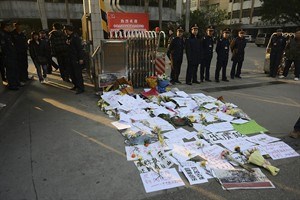
Security guards stand near protest banners and flowers are laid outside the headquarters of Southern Weekly newspaper in Guangzhou, Guangdong province Monday, Jan. 7, 2013. A dispute over censorship at the Chinese newspaper known for edgy reporting evolved Monday into a political challenge for China's new leadership as prominent scholars demanded a censor's dismissal and hundreds of protesters called for democratic reforms. (AP Photo)
January 07, 2013 - 2:22 AM
BEIJING, China - A dispute over censorship at a Chinese newspaper known for edgy reporting evolved Monday into a political challenge for China's new leadership as prominent scholars demanded a censor's dismissal and hundreds of protesters called for democratic reforms.
The scholars and protesters were acting in support of the newspaper in its confrontation with a top censor after the publication was forced to change a New Year's editorial calling for political reform into a tribute praising the ruling Communist Party. Rumours circulated that at least one of the newspaper's news departments was going on strike, but they could not be immediately confirmed.
Protesters gathered outside the offices of the newspaper in the southern city of Guangzhou to lay flowers at the gate, hold signs and shout slogans calling for freedom of speech, political reform, constitutional governance and democracy.
"I feel that the ordinary people must awaken," said one of the protesters, Yuan Fengchu, who was reached by phone. "The people are starting to realize that their rights have been taken away by the Communist Party and they are feeling that they are being constantly oppressed."
The protest came as 18 Chinese academics signed an open letter calling for the dismissal of Tuo Zhen, a provincial propaganda minister blamed for the censorship. The scholars included legal professors, liberal economists, historians and writers.
Peking University law professor He Weifang, who was among the signers, said the newspaper's good work needed to be defended from censorship.
"Southern Weekly is known as a newspaper that exposes the truth, but after Tuo Zhen arrived in Guangdong, he constantly pressured the paper. We need to let him know that he can't do this," He said. "This incident is a test to see if the new leadership is determined to push political reform."
The dispute comes six weeks after China installed a new generation of Communist Party leaders for the next five years with current Vice-President Xi Jinping at the helm. Some of Xi's announcements for a trimmed-down style of leadership, with reduced waste and fewer unnecessary meetings, have raised hopes in some quarters that he might favour deeper reforms in the political system to mollify a public long frustrated by local corruption.
The Guangdong provincial propaganda department did not immediately respond to a faxed list of questions.
China's media in recent years have become increasingly freewheeling in some kinds of coverage, including lurid reports on celebrities and sports figures. Still, censorship of political issues remains tight — although government officials typically claim there is no censorship at all — and the restrictions have drawn increasingly vocal criticism from journalists and members of the public.
News from © The Associated Press, 2013